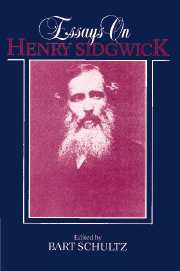Book contents
- Frontmatter
- Contents
- Foreword
- Acknowledgments
- List of contributors
- List of abbreviations
- Introduction: Henry Sidgwick today
- PART I Common-sense morality, deontology, utilitarianism
- PART II Egoism, dualism, identity
- 5 Sidgwick's pessimism
- 6 Sidgwick and the history of ethical dualism
- 7 Sidgwick and the rationale for rational egoism
- 8 Sidgwick on ethical judgment
- PART III Hedonism, good, perfection
- PART IV History, politics, pragmatism
- Index
7 - Sidgwick and the rationale for rational egoism
Published online by Cambridge University Press: 05 June 2012
- Frontmatter
- Contents
- Foreword
- Acknowledgments
- List of contributors
- List of abbreviations
- Introduction: Henry Sidgwick today
- PART I Common-sense morality, deontology, utilitarianism
- PART II Egoism, dualism, identity
- 5 Sidgwick's pessimism
- 6 Sidgwick and the history of ethical dualism
- 7 Sidgwick and the rationale for rational egoism
- 8 Sidgwick on ethical judgment
- PART III Hedonism, good, perfection
- PART IV History, politics, pragmatism
- Index
Summary
One of Sidgwick's concerns in The Methods of Ethics is with the structure of individual rationality. Theories of rationality are concerned with the way in which benefits and harms rationally ought to be allocated among persons and across time.
Theories might be classified by what they say about whose welfare matters. Person-neutral theories say that it is of no rational significance on whom a benefit or harm falls; an agent has reason to promote value, whether this value accrues to the agent or others. By contrast, a Personrelative theory insists that whom a benefit or harm befalls is of great rational significance to the agent. The most common form of person relativity is agent relativity; a theory is agent-relative if it insists that a benefit or harm must befall the agent to be of rational significance to her.
Theories of rationality might also be classified by their attitudes toward the temporal location of benefits and harms. A theory is temporally neutral if it is indifferent when benefits and harms occur; it is temporally relative if the temporal location of a benefit or harm affects its rational significance.
Sidgwick is a friend of rational egoism, although, as we shall see (Section 1), there are different interpretations of the constancy of his friendship. Rational egoism claims that an agent has reason to do x just in case, and insofar as, x is in her own interest, welfare, or happiness.
- Type
- Chapter
- Information
- Essays on Henry Sidgwick , pp. 199 - 240Publisher: Cambridge University PressPrint publication year: 1992
- 6
- Cited by



